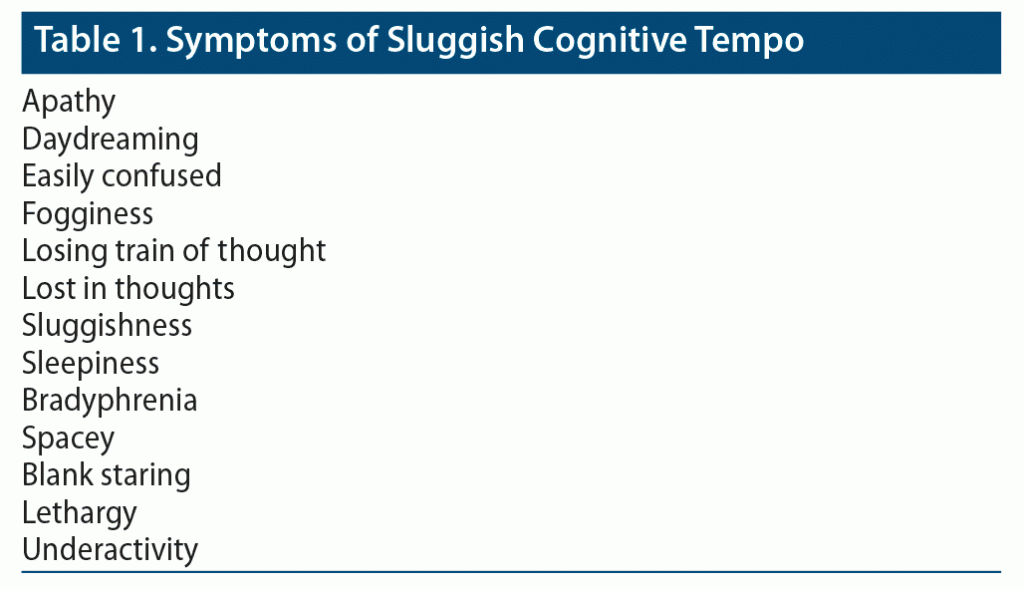
Prim Care Companion CNS Disord 2022;24(1):20br02896
To cite: Naguy A. Sluggish cognitive tempo and ADHD: la même chose? Prim Care Companion CNS Disord. 2022;24(1):20br02896.
To share: https://doi.org/10.4088/PCC.20br02896
© Copyright 2022 Physicians Postgraduate Press, Inc.
aDepartment of Child/Adolescent Psychiatry, Al-Manara CAP Centre, Kuwait Centre for Mental Health, Shuwaikh, Kuwait
*Corresponding author: Ahmed Naguy, MBBch, MSc, Department of Child/Adolescent Psychiatry, Al-Manara CAP Centre, Kuwait Centre for Mental Health, Jamal Abdul-Nassir St, Shuwaikh, Sulibikhat 21315 Kuwait ([email protected]).
There has recently been a resurgence of interest in sluggish cognitive tempo (SCT), a set of behavioral symptoms characterized by daydreaming, mental fogginess, and slowed behavior/mentation.1 As such, SCT might superficially overlap with attention-deficit/hyperactivity disorder (ADHD)–inattentive subtype. Although not formally acknowledged in the current classification systems (DSM-5 or ICD-10), it is now clear that SCT is empirically distinct from ADHD. Thirteen items were identified in a meta-analysis2 as having a mean factor loading ˃ 7 on the SCT factor (Table 1). The internal validity of SCT has been identified across a range of sample types, age ranges, and continents.2
Clinical Course
Interestingly, SCT and ADHD appear to have different developmental trajectories: while the ADHD-hyperactive/impulsive symptom domain tends to decline and the ADHD-inattentive symptom domain plateaus, SCT shows a slight increase across childhood and adolescence.3 Extant evidence, though scant, speaks to the idea that SCT is uniquely tied to poorer functioning and socioemotional adjustment in adulthood.4
Etiology
In a twin study,5 SCT was less heritable than ADHD but more strongly influenced by shared and nonshared environmental factors. Social adversities seem more relevant to SCT than ADHD. Pathological mind wandering has been proposed.6
A neuroimaging study7 of SCT found an association between SCT severity and hypoactivity in the left superior parietal lobe during a cued flanker task, suggestive of deficits in reorientating or shifting of attention, which is different from attention networks implicated in ADHD. A growing body of research indicates that SCT is associated with poorer adjustment across a range of domains of major life activities, with many associations remaining even after controlling for ADHD.7
Psychiatric Comorbidities
SCT has been tied to internalizing disorders (depression more than anxiety), which holds true for children more than for their adult counterparts. SCT is only modestly associated with nighttime sleep problems.
Academic Functioning
SCT, generally, was not demonstrated to negatively impact academic achievement after controlling for ADHD.8 Nonetheless, SCT may be uniquely associated with lower achievements in mathematics, word reading, and written language.
Social and Emotional Functioning
SCT has been shown to predict poorer social skills based on teacher ratings. However, whereas children with ADHD are often disliked by peers owing to noxious behaviors, children with SCT are more likely to be socially withdrawn and isolated.9 Findings converge that consistently document a link between SCT and emotional dysregulation.9
Executive Functioning
Unlike ADHD, which has been linked to a wide range of neuropsychological impairments (eg, response inhibition, working memory, response variability), SCT is not associated with pervasive neuropsychological deficits. There is some indication that SCT might be uniquely related to problems with early information processing or selective attention.10 Overall, clearly SCT is associated with functional impairment not explained by any overlap with ADHD and is related to global impairment, though likely to a lesser degree and less pervasively so than ADHD.
Treatment
Initial evidence indicates that atomoxetine may effectively reduce SCT symptoms,11,12 which sounds advantageous given the strong association with internalizing disorders. SCT response to methylphenidate-based stimulants was particularly poor in a recent open-label trial.13
Conclusion
There is a dire need for additional longitudinal research for a better understanding of the developmental course of SCT, longitudinal correlates, and pathways by which SCT is associated with developmental outcomes and functional impairments.
Published online: January 27, 2022.
Potential conflicts of interest: None.
Funding/support: None.
References (13)

- Kamradt JM, Momany AM, Nikolas MA. Sluggish cognitive tempo symptoms contribute to heterogeneity in adult attention-deficit hyperactivity disorder. J Psychopathol Behav Assess. 2018;40(2):206–223. PubMed CrossRef
- Becker SP, Leopold DR, Burns GL, et al. The internal, external, and diagnostic validity of sluggish cognitive tempo: a meta-analysis and critical review. J Am Acad Child Adolesc Psychiatry. 2016;55(3):163–178. PubMed CrossRef
- Leopold DR, Christopher ME, Burns GL, et al. Attention-deficit/hyperactivity disorder and sluggish cognitive tempo throughout childhood: temporal invariance and stability from preschool through ninth grade. J Child Psychol Psychiatry. 2016;57(9):1066–1074. PubMed CrossRef
- Becker SP, Burns GL, Garner AA, et al. Sluggish cognitive tempo in adults: psychometric validation of the Adult Concentration Inventory. Psychol Assess. 2018;30(3):296–310. PubMed CrossRef
- Moruzzi S, Rijsdijk F, Battaglia M. A twin study of the relationships among inattention, hyperactivity/impulsivity and sluggish cognitive tempo problems. J Abnorm Child Psychol. 2014;42(1):63–75. PubMed CrossRef
- Adams ZW, Milich R, Fillmore MT. A case for the return of attention-deficit disorder in DSM-5. ADHD Rep. 2010;18(3):1–6. CrossRef
- Fassbender C, Krafft CE, Schweitzer JB. Differentiating SCT and inattentive symptoms in ADHD using fMRI measures of cognitive control. Neuroimage Clin. 2015;8:390–397. PubMed CrossRef
- Marshall SA, Evans SW, Eiraldi RB, et al. Social and academic impairment in youth with ADHD, predominately inattentive type and sluggish cognitive tempo. J Abnorm Child Psychol. 2014;42(1):77–90. PubMed CrossRef
- Becker SP, Langberg JM. Sluggish cognitive tempo among young adolescents with ADHD: relations to mental health, academic, and social functioning. J Atten Disord. 2013;17(8):681–689. PubMed CrossRef
- Huang-Pollock CL, Nigg JT, Carr TH. Deficient attention is hard to find: applying the perceptual load model of selective attention to attention deficit hyperactivity disorder subtypes. J Child Psychol Psychiatry. 2005;46(11):1211–1218. PubMed CrossRef
- Wietecha L, Williams D, Shaywitz S, et al. Atomoxetine improved attention in children and adolescents with attention-deficit/hyperactivity disorder and dyslexia in a 16 week, acute, randomized, double-blind trial. J Child Adolesc Psychopharmacol. 2013;23(9):605–613. PubMed CrossRef
- Naguy A, Al-Enezi N, AlShalabi SR. Atomoxetine in-focus! Asian J Psychiatr. 2020;49:101634. PubMed CrossRef
- Fırat S, Gul H, Aysev A. An open-label trial of methylphenidate treating sluggish cognitive tempo, inattention, and hyperactivity/impulsivity symptoms among 6- to 12-year-old ADHD children: what are the predictors of treatment response at home and school? J Atten Disord. 2021;25(9):1321–1330. PubMed CrossRef
Enjoy this premium PDF as part of your membership benefits!




